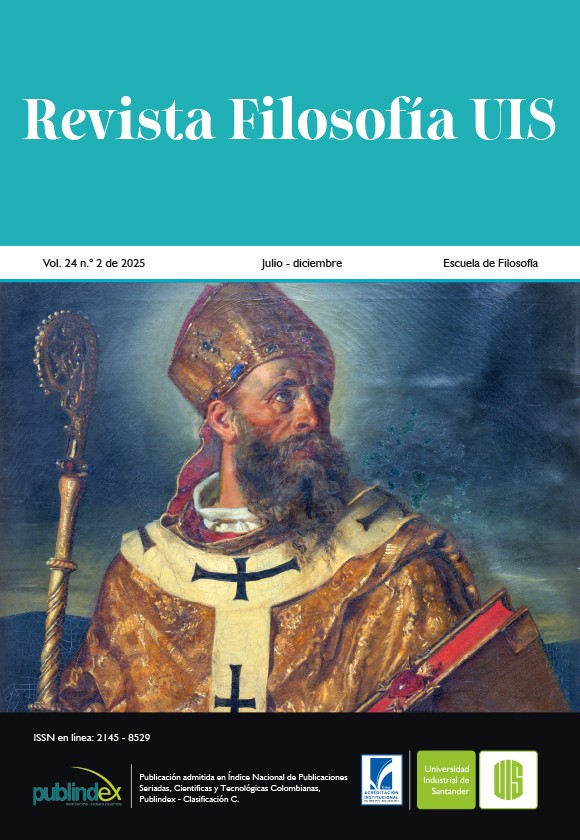Politics and Language in Jacques Rancière: the Adventures of the Literary Animal
Published 2025-03-29
Keywords
- Rancière,
- literary animal,
- language,
- poetics,
- ontology
- politics ...More
How to Cite
Copyright (c) 2025 Revista Filosofía UIS

This work is licensed under a Creative Commons Attribution 4.0 International License.
Abstract
The article aims to clarify the concept of literary animal in the work of Jacques Rancière. Through an analysis of the state of the art, it proposes regularities in the understanding of the concept and focuses on the distinction proposed by Rancière himself around the concept. Then it focuses on the reconstruction of the theory of language that underlies the literary animal based on the inheritances in the treatment of language that Rancière receives from the French context. Subsequently, follows the question of the status that the literary animal should have as a general background of the work of the French thinker: is it an ontology or a poetics. Finally, a conclusion is offered in which the implementation of the literary animal as an exercise of thought is described in relation to a confrontation with Habermas about how language should be used in politics.
Downloads
References
- Asensi Pérez, M. (2006). Los años salvajes de la teoría: Ph. Sollers, Tel Quel, y la génesis del pensamiento estructuralista francés. Tirant lo Blanch.
- Badiou, A. (2013). Las aventuras de la filosofía francesa. Eterna Cadencia.
- Behler, E. (2005). La teoría del lenguaje del primer romanticismo y su influencia en Nietzsche y Foucault. Estudios Nietzsche, (5), 67-86. https://doi.org/10.24310/EstudiosNIETen.vi5.9224
- Biset, E. (2012). Retorno y crisis de lo político. Estudios Sociales, 42(1), 31-56. https://doi.org/10.14409/es.v42i1.2690
- Blanco Rivero, J. J. (2012). La historia de los conceptos de Reinhart Koselleck: conceptos fundamentales, Sattelzeit, temporalidad e histórica. Politeia, 35(49), 1-33.
- Bourdieu, P., y Passeron, J. C. (1996). La reproducción. Editorial Fontamara.
- Camelo, D. (2023). Discurso, política y verdad: Michel Foucault y la función del intelectual. Revista Filosofía UIS, 22(1), 225-249. https://doi.org/10.18273/revfil.v22n1-2023011
- Chambers, S. (2013). The Lessons of Rancière. Oxford University Press.
- Compagnon, A. (2015). El demonio de la teoría. Editorial Acantilado.
- Cusset, F. (2005). French Theory. Editorial Melusina.
- Davis, O. (2011). Jacques Rancière. Polity Press.
- Deleuze, G. (2002). Diferencia y repetición. Amorrortu Editores.
- Derrida, J. (1978). De la Gramatología. Siglo XXI Editores.
- Descombes, V. (2004). Lo mismo y lo otro. Cuarenta y cinco años de filosofía francesa. Editorial Crítica.
- Dosse, F. (2004). Historia del estructuralismo (Vol. 1). Ediciones Akal.
- Dumoulié, C. (2023). Literatura y filosofía. La gaya ciencia de la literatura. Programa editorial Univalle.
- Foucault, M. (1999). Entre filosofía y literatura. Obras esenciales I. Ediciones Paidós.
- Foucault, M. (2016). Las palabras y las cosas. Siglo XXI Editores.
- Habermas, J. (1993). El discurso filosófico de la modernidad. Taurus.
- Kant, I. (2006). Crítica de la razón pura. (P. Ribas, Trad.). Taurus.
- Lafont, C. (1993). La razón como lenguaje. Editorial Visor.
- Lane, J. F. (2021). Ranciére's 'literary animals': the conditions of possibility of 'political subjectivation'. Textual Practice, 35(4), 543-563. https://doi.org/10.1080/0950236X.2020.1733066
- Marchart, O. (2006). En el nombre del pueblo. La razón populista y el sujeto de lo político. Cuadernos del CENDES, 23(62), 37-58.
- McHoul, A., y Grace, W. (2002). A Foucault Primer. Routledge.
- Mecchia, G. (2019). Who’s the Subject of Politics? Language in Jacques Rancière. En S. Durham y D. Gaonkar (Eds.), Distribution of the Sensible, Rancière, between Aesthetics and Politics (pp. 155-172). Northwestern University Press Evanston.
- Pardo, J. L. (2014). A propósito de Deleuze. Editorial Pre-Textos.
- Platón (2010). Obra Completa. (Eggers Lan, C., Trad.). Gredos.
- Quintana, L. (2020). Política de los cuerpos. Herder Editorial.
- Rancière, J. (1991). Breves viajes al país del pueblo. Ediciones Nueva Visión.
- Rancière, J. (1993). Los nombres de la historia. Ediciones Nueva Visión.
- Rancière, J. (1996). El desacuerdo. Ediciones Nueva Visión.
- Rancière, J., Guénoun, S.,Kavanagh, J. H. y Lapidus, R. (2000). Literature, Politics, Aesthetics: Approaches to Democratic Disagreement. SubStance, 29(2), 3-24.
- Rancière, J., y Panagia, D. (2000). Dissenting Words: A Conversation with Jacques Rancière. Diacritics, 30(2), 113-126.
- Rancière, J. (2009a). La palabra muda. Eterna Cadencia.
- Rancière, J. (2009b). A few remarks on the method of Jacques Rancière. Parallax, 15(3), 114-123.
- Rancière, J. (23 de junio de 2009c). Insistances démocratiques. Vacarme, (48). https://vacarme.org/article1772.html
- Rancière, J. (2010a). El maestro ignorante. Laertes Ediciones.
- Rancière, J. (2010b). Momentos políticos. Capital Intelectual.
- Rancière, J. (2011a). El tiempo de la igualdad. Herder Editorial.
- Rancière, J. (2011b). Política de la literatura. Libros del Zorzal.
- Rancière, J. (2011c). En los bordes de lo político. Ediciones La Cebra.
- Rancière, J. (2012). El espectador emancipado. Manantial.
- Rancière, J. (2013a). El filósofo y sus pobres. Universidad Nacional General Sarmiento.
- Rancière, J. (2013b). The Politics of Aesthetics (G. Rockhill, Trad.). Bloomsbury Publishing.
- Rancière, J. (2014a). El reparto de lo sensible. Prometeo Editorial.
- Rancière, J. (2014b). El método de la igualdad. Ediciones Nueva Visión.
- Rancière, J. (2015a). El hilo perdido. Manantial Editores.
- Rancière, J. (2015b). L’excès des mots: pratiques de desidentiication et logiques heterogènes de la culture. Entretien avec Jacques Rancière. Práticas da História, Journal on Theory, Historiography and Uses of the Past, 1(1), 185-214.
- Rancière, J. (2019). Disenso. Ensayos sobre estética y política. Fondo de Cultura Económica.
- Rancière, J., y Bassas, J. (2019). El litigio de las palabras. NED Ediciones.
- Robson M. (2009). ‘A literary animal’: Rancière, Derrida, and the Literature of Democracy. Parallax, 15(3), 88-101. https://doi.org/10.1080/13534640902982850
- Rockhill, G. (2011). Rancière’s Productive Contradictions. Symposium: Canadian Journal of Continental Philosophy, 15(2), 28-56.
- Ross, A. (2010). Expresivity, literarity, Mute Speech. En J. P. Deranty (Ed.), Rancière´s Key Concepts (pp. 133-150). Acumen.
- Ruby, C. (2010). Rancière y lo político. Prometeo Editorial.

